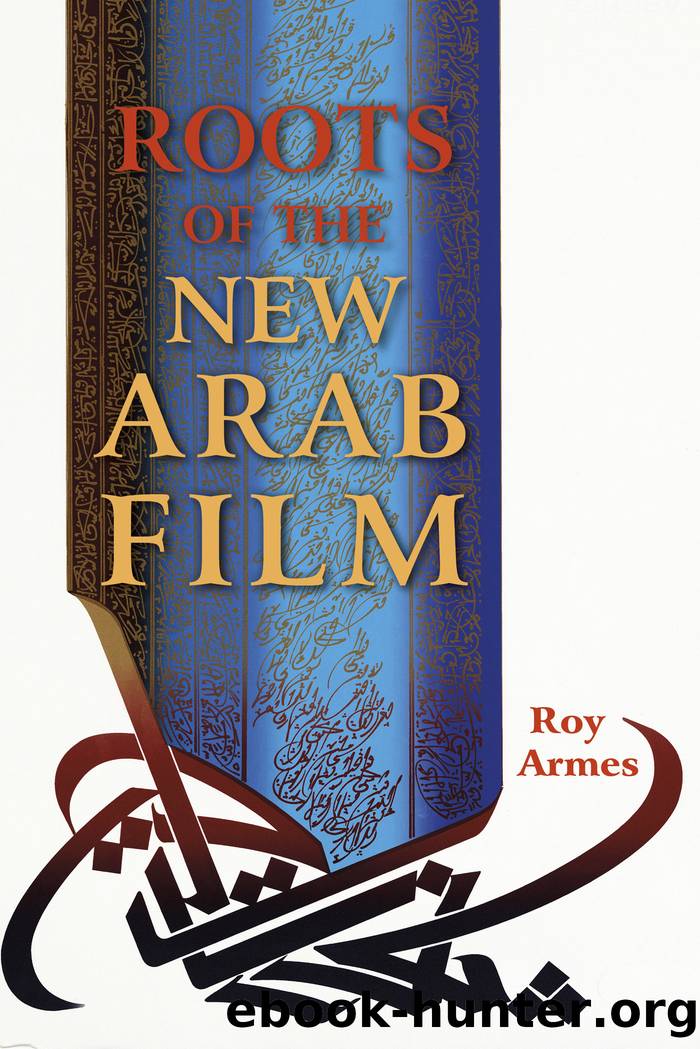Roots of the New Arab Film by Armes Roy;

Author:Armes, Roy;
Language: eng
Format: epub
Publisher: Indiana University Press
Published: 2018-03-15T00:00:00+00:00
Egypt
We have already noted Youssef Chahineâs inspirational role in offering the example of a new kind of Arab filmmaking from which younger filmmakers across the region could draw inspiration. His work in the 1980s also offered a specific new model of production finance, drawing on foreign funding sources, such as the French Fonds Sud Cinéma. This allowed Chahine to create an internationally recognized Egyptian cinema, acclaimed at festivals worldwide, that was not wholly dependent on local Egyptian box office receipts. His own production company, Misr International Films, gained valuable experience that could be passed on through coproduction agreements. This was the particular mode of independent production followed by two of his most talented former assistant directors, Yousry Nasrallah and Asma El Bakry (the name is variously spelled in different transliterations) from the late 1980s and early 1990s onward. Both worked consistently outside the structures of the Egyptian commercial industry.
Yousry Nasrallah was born in Cairo in 1952 and, like Chahine, was born into a Christian family. After studies of economics and sociology at Cairo University, he followed the conventional pattern of those wishing eventually to become film directors in Egypt. He studied at the Cairo Higher Cinema Institute, had a spell as a film critic in Beirut, and then worked as assistant to a number of directors, including Volker Schlöndorf, Omar Amiralay, and Youssef Chahine. He worked as assistant to Chahine on a number of films, from Farewell Bonaparte onward, and coscripted AlexandriaâNow and Forever. In return, Chahine produced Nasrallahâs first features and used the contacts made through his production company to help him receive support from French coproducers and from the Fonds Sud Cinéma.
Nasrallahâs debut film, Summer Thefts / Vols dâété / Sariqât sayfiyyah (1988)âwhich is, according to Benjamin Geer, âlargely autobiographicalâ215âoffers a vivid look at Egypt in the summer of 1961, as Nasserâs land reforms began to take shape. The previous social organization had clear boundaries between the wealthy landowners and the peasants who worked in their fields and owned nothing. Nasser, heard several times on the radio, promises a radical social reform that throws everything into confusion.
The previous situation established clear social distinctions between the two classes, though there were inevitably relationships that crossed the boundaries, examples of which are portrayed in the film. There is a tentative relationship between the feminist-minded Dahlia and Abdallah, a young peasant boy offered an education by the family, and there are also complex emotions for the women who spend their lives as servants in the big house and develop particularly close relationships with the children growing up there, who spend more time with them than with their parents. It is in this context that a friendship develops between Yasser and a peasant boy, Leil.
The film concentrates on the people in the big house who are deeply affected by Nasserâs proposals. Since the land has been inherited by three sisters, there are inevitably tensions between them and their husbands about how to deal with the situation and whether to sell. There are also marital complications.
Download
This site does not store any files on its server. We only index and link to content provided by other sites. Please contact the content providers to delete copyright contents if any and email us, we'll remove relevant links or contents immediately.
Kathy Andrews Collection by Kathy Andrews(10520)
The remains of the day by Kazuo Ishiguro(7551)
Spare by Prince Harry The Duke of Sussex(4199)
Paper Towns by Green John(4169)
The Body: A Guide for Occupants by Bill Bryson(3802)
Be in a Treehouse by Pete Nelson(3213)
Harry Potter and the Goblet Of Fire by J.K. Rowling(3046)
Goodbye Paradise(2964)
Never by Ken Follett(2882)
Into Thin Air by Jon Krakauer(2702)
The Remains of the Day by Kazuo Ishiguro(2619)
The Genius of Japanese Carpentry by Azby Brown(2609)
The Cellar by Natasha Preston(2595)
Drawing Shortcuts: Developing Quick Drawing Skills Using Today's Technology by Leggitt Jim(2532)
120 Days of Sodom by Marquis de Sade(2439)
Architecture 101 by Nicole Bridge(2350)
The Man Who Died Twice by Richard Osman(2300)
Machine Learning at Scale with H2O by Gregory Keys | David Whiting(2292)
Fairy Tale by Stephen King(2071)
